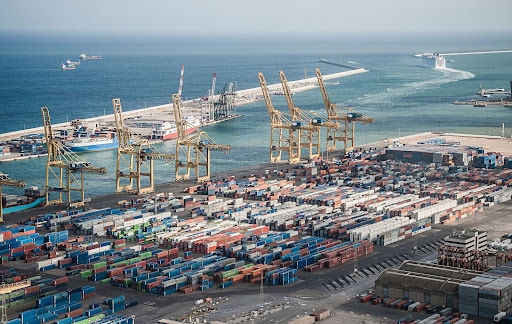Unless you were living under a rock in 2021, you were likely bombarded with news about the global supply chain. From the Evergreen blockage to endless lockdowns in China to consistent shipping delays, the past two years have been bad for business in the world of logistics.
More importantly, it has laid bare the relationship between a brand’s success and its ability to sustainably and reliably source products from around the globe. Only when you have a supply chain that is robust, efficient & reliable are you then able to market these efficiencies as consumer benefits, such as same day, expedited & 1- day shipping.
Market research has shown time and time again that your supply chain can impact more than just your sales. It can change the way that consumers view your brand, and can make or break your business.
Today, we’ll explore the critical relationship between your supply chain and your marketing strategy. We’ll also talk about how you can convert supply chain efficiencies into sales, brand equity, and success in the realm of e-commerce.
Why You Have to Get Supply Chain “Right”
Let’s start with an obvious fact. If you have a weak supply chain, it will result in a lack of inventory, which will hinder your ability to sell effectively. Nobody wants to log into Amazon, find something that they love, and then see the dreaded “out of stock message.”
What if your supply chain fails? What’s the business impact?
- Reduction in Profitability: Your supply chain can have a major impact on the profitability of your business. Your goal as an owner should be to maximize quality and minimize price. This takes work – you need to spend time researching suppliers and building the right relationships to get great products into your supply chain.
- Adding Complexity: It is important to limit the complexity of your supply chain to improve resiliency. Over Complex supply chains will often fail under stress, which can have a devastating impact on your business.
- Restricted Flow of Products: Ultimately, if you can’t get product into the hands of your customers, you won’t be able to grow. If you don’t feel like you can handle managing products effectively, outsource it by partnering with a reputable 3PL.
What can a great supply chain do for you? In short, a whole heck of a lot.
- Improves Valuation: Researchgate has dozens of articles that explain how a great supply chain leads to a higher valuation. In fact, a company’s supply chain is often the 2nd or 3rd most important variable in its valuation, as it can be a make or break factor in performance and profitability.
- Adds Scalability: The capacity of your supply chain is directly related to your ability to scale. If your supply chain is restrictive and cannot grow with you, then you will eventually run into bottlenecks that can cap your growth.
- BuildsBrand Equity: A great supply chain will improve the value of your brand and help you sell better online. 26.8% of reviews talk about shipping, and almost 40% of reviews mention the state of the packaging and delivery expectations.
The Synergy Between Supply Chain and Marketing
Picture this: You’re doing well. Business is booming and there is money to burn. You spend thousands on advertising, and sales continue to climb. One day, you log into Seller Central and boom,our inventory is gone.
Investing in advertising when your supply chain lacks capacity will hurt your profitability, and result in a lot of wasted money. When you have a resilient supply chain, you can focus more on the strategic elements of your business.
Consumer expectations are moving towards fast delivery services thanks to Amazon Prime. Speed of shipping dramatically increases the probability of a conversion.
If your logistics network is optimized to offer same day, 1-day, or 2-day shipping, this is a major advantage that you will have when marketing your products. Connecting your shipping solution to your product marketing can give you a much needed edge over your competition.
Instead of having separate strategies for marketing and your supply chain, work to build a great supply chain that you can use as a marketing tool. Don’t think “man, I need to build a better supply chain,” think “how can I leverage what I’ve built when marketing my product?”
How to Optimize Your Supply Chain
Here are three pieces of advice that anyone looking to optimize their supply chain can follow:
Reduce Complexity
When you can, always think “how can I make this easier?” Always look for ways to eliminate inefficiencies.
Think about streamlined shipping solutions, build relationships with key business vendors, and as much as you can, source products from single manufacturers.
Add Visibility
Consumers love visibility and information. As a business owner, you use every scrap of information you have to to make informed decisions based on key supply chain performance indicators.
In the same way, create open lines of communication with your consumer. Arm yourself with the latest information within your logistics network and build relationships with key stakeholders. When you need to make a critical supply chain decision that impacts sales, your network should be able to provide you with the information you need to feel confident with your choice.
Take Advantage of a 3PL
A 3PL is an amazing way to simplify your supply chain solution. A great 3PL partner will be able to offer numerous value-add services like bundling, labeling, and picking & packing. Onboarding a 3PL can be a great way for you to free up more time for strategic decision making.
Choosing a 3PL to partner with can be a challenging process, so be sure to do your due diligence and take time to select a partner with the right credentials, who really understands & believes in your business.
How to Optimize Your Marketing Efforts Around Your Supply Chain
Think of a super successful Amazon business. What do you see?
- Free, fast shipping in 2 days or less
- Incredibly fast processing, sometimes as little as a few hours
- A wide availability of products in multiple locations in their key market
- Great customer support and a seamless returns process
Building a great supply chain doesn’t just improve the profitability and efficiency within your business. It represents the chance for you to adopt a marketing strategy that highlights this efficiency, which can be converted into additional sales and brand equity.
Here are a few things to keep in mind if you are highlighting your supply chain in your marketing strategy:
- Network Capacity: The Christmas rush is right around the corner? Make sure you plan for this and have enough stock to serve your customers at all times of the year.
- Resiliency: Work to make your supply chain as resilient as possible. When other companies are out of stock, differentiate yourself by preparing for supply shocks.
- Stock Levels: Find ways to tell your customers that you have lots of available stock for them to buy.
- Communication: Give your customers as much line-of-sight as possible into your order flow and processing speed.
Final Thoughts
Marketing and Supply Chain functions are both fundamental to your business’ operations. Understanding the relationship between them and maximizing synergies in the two are a critical step to realizing the next step of your business’ growth.
About the Author
Blair Forrest is the Chief Marketing Officer and Founder of AMZ Prep, one of Canada’s fastest-growing startups in the fulfillment space that helps businesses and brands with their warehousing & logistics needs. From flipping items at garage sales to becoming a global entrepreneur, eCommerce is in Blair’s DNA. Starting as an Amazon Seller, Blair has used his experience to build AMZ Prep with a focus on addressing the pain points he experienced as a seller to ensure your Amazon FBA Business reaches its full potential.





